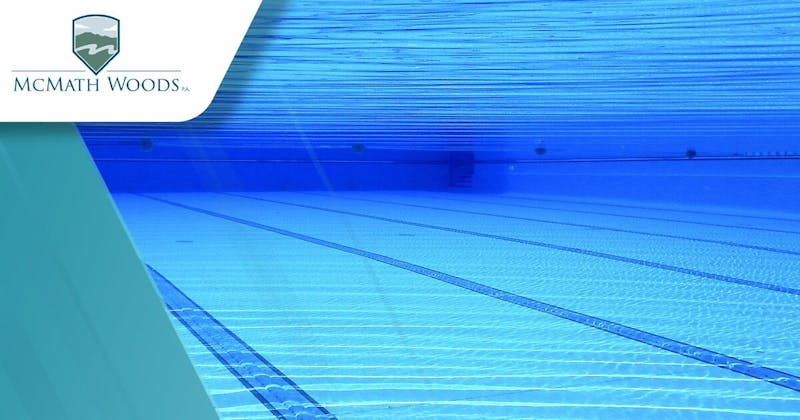
As temperatures warm up, more people will be heading into pools in their backyards, communities, gyms, and public parks across Little Rock to cool off. While swimming pools can be a great place to play around or exercise on hot weather days, they also pose dangers. Take time to learn about the most common swimming pool hazards to keep you and your loved ones safe this swim season.
Pool Dangers That Often Result in Injuries or Illnesses
Some swimming pool hazards cause more people to get hurt or lose their lives than others. Those include:
- Slip and fall injuries: Many pools have high gloss tiles or other potentially slippery surfaces surrounding them. The combination of pool chemicals (like chlorine), cleaning solvents, soap or oil residue left behind by people’s bodies, water, and other substances put individuals at risk of suffering slips and falls, which can not only lead to strains and sprains and broken bones but also head injuries if someone loses their footing and their skull strikes the ground.
- Pool toxicity injuries: The chemicals used to shock pools so that they eliminate harmful germs are generally toxic when inhaled or ingested. Thousands of patients go to the emergency room suffering from toxic exposure each year. Depending on the type and length of exposure, this toxicity can result in brain damage, respiratory problems, and other concerns.
- Entrapment injuries: These can happen in various ways, including if a person inserts their hand or foot into the pool filter opening in an effort to retrieve it or if hair becomes entangled in it. Such injuries can also occur if an inexperienced swimmer, like a child, falls off and then gets trapped under an inflatable toy. Typical caught-in injuries like broken bones, lacerations, or the severing of limbs resulting in amputations of hands or feet, as well as head and neck injuries, often stem from incidents like these. Drownings can occur as well.
- Pool slide or diving board injuries: Either one of these can lead to someone unexpectedly ending up in the water, which can cause someone who doesn’t know how to swim to drown. However, each of these poses a danger of head injury, especially if someone inadvertently strikes their head on one of these hard surfaces. It’s also not unheard of for individuals to suffer a neck injury leading to spinal cord damage and paralysis when jumping off a diving board or pool deck into a shallow body of water head-first.
- Electrocution: An incorrectly grounded electrical system that powers a pool’s filtering system, lights, heating element, or some other feature may lead to electrical currents entering the water, causing a swimmer to suffer an electrical shock that causes their drowning death.
How Prevalent Is Drowning?
When you thought about swimming pool hazards, you probably thought of drowning first before any of the concerns listed above. That would have been a valid concern as, according to the Centers for Disease Control and Prevention (CDC), at least 4,000 Americans lose their lives in drowning incidents annually, and 8,000 near-drownings lead to patients being seen in hospital emergency rooms. This fatal incident is the number one cause of death for children aged one to four.
Ways To Minimize the Risk of Swimming Pool Hazards Harming You or Your Kids
While you may not be able to completely account for every possible risk and take precautions to avoid potential harm, such as knowing and avoiding some instances of electrical shock, there are some steps to enhance your safety to avoid some of the other dangers described above. Those steps include:
- Ensuring you or anyone else getting in the water knows how to swim
- Making sure to only enter a pool when there’s a lifeguard on duty
- Always make sure an adult is supervising any minors swimming
- Placing a safety fence around your pool if you have kids of your own or if it’s easy for kids in the community to gain access to it
- Considering placing a retractable cover atop your pool to ensure no one can easily fall into it
- Installing lights in the pool so that it’s easier to see if anyone gets/falls into it when it’s dark
- Ensuring anyone who hasn’t perfected their swimming (like youth) or who has health impairments wears a lifejacket or floatation device
- Remaining in the shallow end of the pool if one’s ability to tread water hasn’t been perfected
- Having the pool regularly serviced, including making sure its electrical system is properly functioning and ladders are tightly screwed in place
- Avoid engaging in horseplay when on a pool deck, diving board, pool slide, etc.
- Never diving into the shallow end of the pool
- Having the pool’s PH levels regularly checked
The list above is only an abbreviated listing of steps pool owners and visitors can take to reduce their risk of having a catastrophic swimming pool accident that claims their lives or that of others.
If you’ve had the misfortune of getting hurt while at a swimming pool or a close family member did due to someone else’s negligence, consider reaching out to us at McMath Woods P.A. to discuss what happened. We offer free consultations during which we’ll want to know more about the potential hazard that is responsible for the harm you suffered and what legal rights you may have to hold the swimming pool owner liable for their wrongdoing.

